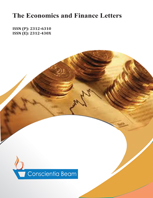How Does Financial Development Affect Economic Growth Volatility? Evidence from a Penalized Panel Quantile Regression
DOI:
https://doi.org/10.18488/29.v9i1.2990Abstract
This paper aims to examine the effect of financial development on economic growth volatility for a sample of 63 countries during the period 1996-2016. Previous studies have reported mixed and inconclusive results regarding such an effect. I ascribe these controversial findings to the limitations of the ordinary least squares (OLS) regression and adopt the method of quantile regression with panel data as developed in Canay (2011). This methodological contribution allows us to test whether the effect of financial development varies across the full distribution, especially at the extreme quantiles of economic growth volatility. Unlike OLS regression, quantile regression captures the whole picture of the relationship between financial development and economic growth volatility by estimating the effect at each quantile of the distribution. Overall, our empirical results show that the effect of financial development on economic growth volatility is negative. However, this effect appears to not be uniform across the quantiles of the economic volatility distribution. This paper sheds more light on the association between financial development and economic growth volatility.

